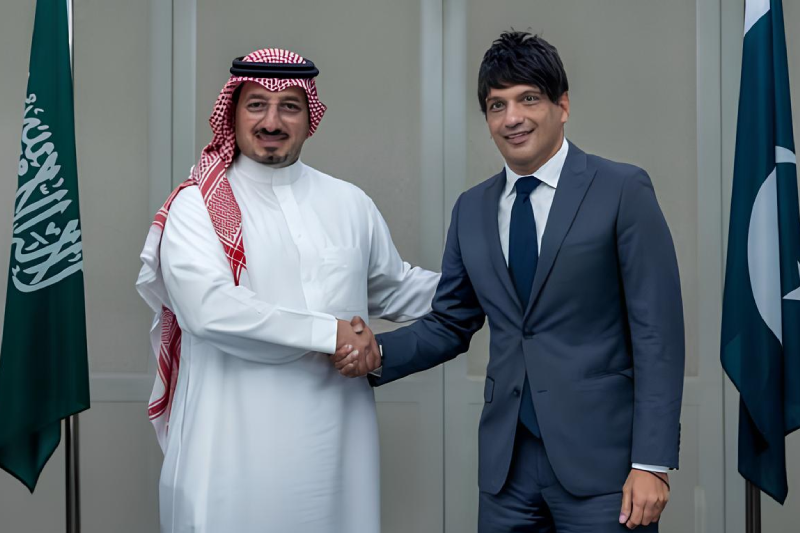The Pakistan Football Federation and Saudi Arabian Football Federation have formalized a strategic partnership through a Memorandum of Understanding signed on October 18, 2025, marking a significant step in Pakistan’s efforts to rebuild its football infrastructure through international cooperation. The agreement, signed by PFF President Mohsin Gilani and SAFF President Yasser Al-Misehal, establishes comprehensive collaboration across multiple areas of football development.
Formal Partnership Agreement Signed
The Pakistan Football Federation has entered into a formal partnership with the Saudi Arabian Football Federation to increase cooperation and promote football development between the two countries. According to PFF sources, the memorandum of understanding was signed on October 18 by PFF President Mohsin Gilani and SAFF President Yasser Al-Misehal.
Officials said the agreement reflects a shared commitment to raising football standards and creating pathways for players, coaches, and officials from both nations. This partnership represents one of the most significant international collaborations in Pakistan football’s recent history, providing access to Saudi Arabia’s advanced football infrastructure and expertise.
Key Areas of Cooperation
Under the MoU, the two federations will collaborate in several key areas, including coach development, women’s football, and youth football. The partnership covers multiple levels of the game, from grassroots initiatives to senior national team cooperation, ensuring comprehensive development across Pakistan’s football ecosystem.
The agreement includes programs focused on coach education, women’s football, and youth development three areas identified as critical priorities for Pakistan’s football revival. By addressing these foundational elements simultaneously, the partnership aims to create sustainable long-term improvements rather than temporary fixes.
Exchange Programs and Training Initiatives
The partnership ensures the launch of exchange programs, enabling players and coaches to train in each other’s countries to gain international exposure and experience. These exchanges will provide Pakistani football stakeholders with firsthand exposure to Saudi Arabia’s modern football systems, training methodologies, and professional environments.
In addition, the federations plan to organize joint training camps and workshops to improve technical expertise and promote grassroots initiatives aimed at nurturing young talent. These collaborative training environments will facilitate knowledge transfer and allow Pakistani coaches to learn from Saudi expertise while sharing their own insights.
Women’s Football Development Focus
Women’s football, a growing area in Pakistan, is set to benefit significantly from this partnership, with both federations planning initiatives to provide international exposure and structured training for female athletes. The collaboration builds on previous engagements between the two nations’ women’s teams, including friendly matches that provided valuable competitive experience.
Pakistan’s women’s football program has faced significant challenges including limited infrastructure, irregular international fixtures, and cultural barriers. The Saudi partnership offers potential solutions through structured development programs, coaching education, and competitive opportunities that can accelerate women’s football growth in Pakistan.
Youth Development Pathways
Under this new partnership, both federations will collaborate to organize player and coach exchange programs, along with joint training camps aimed at nurturing emerging talent and improving technical expertise on both sides. Youth football represents a particular focus area, with both nations recognizing that sustainable success requires investing in junior development.
The youth development components include potential competitions at U-16 and U-19 levels, providing Pakistani young players with crucial international experience against quality opposition. These age-group matches help bridge the gap between domestic youth football and senior international requirements.
Saudi Arabia’s Regional Football Vision
The MoU reflects Pakistan’s ongoing efforts to rebuild its football ecosystem and forge stronger ties with footballing nations in Asia. It also aligns with Saudi Arabia’s broader vision to expand its influence and support in Asian football through strategic collaboration and investment.
Saudi Arabia has demonstrated significant commitment to football development regionally and globally, investing heavily in infrastructure, coaching education, and international partnerships. Their willingness to collaborate with Pakistan demonstrates recognition of mutual benefits and shared commitment to raising Asian football standards.
Technology and Administrative Support
PFF will be provided with the ‘My SAFF’ application/software which will enable country-wide football clubs to communicate efficiently with PFF. The clubs can raise questions and suggestions, inform about player transfers, etc. through the application, according to previous discussions about the partnership.
This technological infrastructure support addresses critical administrative weaknesses within Pakistan’s football system. Efficient communication systems between the federation and clubs represent fundamental requirements for professional football administration that Pakistan has historically lacked.
Long-Term Strategic Perspective
Officials from both federations emphasized that the partnership is designed to create long-term opportunities for growth rather than short-term gains. For Pakistan, the deal offers valuable access to Saudi Arabia’s advanced football infrastructure, coaching systems, and player development pathways.
The emphasis on sustained collaboration rather than isolated initiatives reflects understanding that meaningful football development requires consistent investment over extended periods. Quick fixes and temporary programs have repeatedly failed to produce lasting improvements in Pakistan football.
Context of Pakistan Football’s Revival Efforts
This collaboration marks another significant stride in Pakistan’s efforts to revive its footballing structure, develop local talent, and establish a stronger presence on the Asian football stage. Pakistan has faced numerous administrative challenges in recent years, including FIFA suspensions and domestic league instability.
Recent improvements in governance under FIFA’s normalization process have created conditions where international partnerships like this Saudi collaboration can proceed productively. Stable administration provides the foundation necessary for implementing development programs effectively.
Historical Pakistan-Saudi Football Relations
Sports pundits have reacted positively to the deal, terming it as a “positive development” with potential long-term gains for Pakistan’s football world. With increased investment in sport in Saudi Arabia and rejuvenated administrative balance in Pakistan’s football federation, the alliance is viewed as an opportunity to raise the level of the game within the country.
This MoU represents a renewal and formalization of football cooperation between the two nations, building on existing diplomatic and cultural ties. Pakistan and Saudi Arabia share long-standing bilateral relationships across multiple sectors, providing foundation for expanded sports collaboration.
Challenges and Implementation
While the MoU creates frameworks for cooperation, successful implementation requires sustained commitment, adequate funding, and effective coordination between both federations. Pakistan must ensure it can capitalize on opportunities created through this partnership by maintaining administrative stability and allocating resources appropriately.
The true test of this agreement will emerge through tangible improvements in Pakistan football’s competitive standards, youth development outcomes, and women’s football participation over coming years. Monitoring mechanisms and regular evaluation will prove essential for ensuring the partnership delivers intended benefits.
Regional Football Diplomacy
The Pakistan-Saudi football partnership exemplifies how sports diplomacy can strengthen broader bilateral relationships while advancing mutual interests. Football cooperation provides soft power benefits for both nations while contributing to Asian football’s overall development.
As Saudi Arabia pursues regional leadership in football development and Pakistan seeks to rebuild its football program, this partnership aligns strategic interests in ways that benefit both parties. The collaboration may inspire similar partnerships between other Asian nations seeking to accelerate their football development through international cooperation.
Also read this: PCB Plans Changes After Pakistan Women’s World Cup Failure
Looking Ahead
As both federations begin implementing programs outlined in the MoU, the Pakistani football community watches hopefully for tangible improvements in coaching standards, player development, and competitive results. The partnership’s success will ultimately be measured not through ceremonial signings but through on-field improvements and sustainable institutional strengthening.
For Pakistan football, which has endured decades of underachievement and administrative turmoil, this Saudi partnership represents renewed hope that international collaboration can help unlock the nation’s untapped football potential. The coming years will reveal whether this optimism translates into meaningful progress toward establishing Pakistan as a competitive force in Asian football.
Keep conntected with us Facebook,Youtube and Twitter for latest Sports news happening around the globe.

